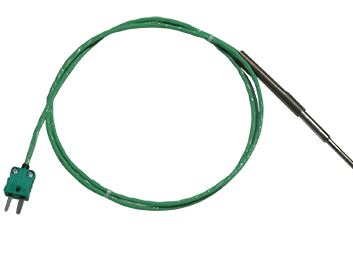Fuji Electric, Thermocouples
A thermocouple is a sensor used to measure temperature. It is composed of two metals of different natures connected to one end. When the junction of these metals is heated or refrigerated, a current is established in the circuit and generates an electromotive force (EMF) which depends on the nature of the wires used. The quality metals used are homogeneous and allow the thermocouple to be subjected over its entire length to different temperature gradients without disturbing the electromotive force. The measuring instruments receive the thermocouple directly and control the cold junction. These thermocouple alloys are generally available in yarns. Thermocouples are versatile temperature sensors and are commonly used for many applications : from the thermocouple for industrial use to the standard thermocouple for domestic appliances and equipment. There are many models and technical specifications. It is extremely important to understand the basic structure, operating mode and temperature ranges to determine the type and material of the thermocouple best suited for your application.

3 types of thermocouples :
- Type S platinum thermocouple
- Type K nickel alloy thermocouple
- Type T, J and N thermocouples
Avantages:
- Low cost
- High temperature stability
- Easy-to use
- Very small dimensions and numerous diameters available
- Hot point posistion allowing the temperature measurement at the end
- Short response time
- Good vibration resistance
Mounting / wiring:
Compliance with polarity must be compulsory (additional FEM interferences) Use suitable wire for thermocouples : so-called "EXTENSION" or "COMPENSATION".
This insulation resistance is from 1000 MW to 5000 MW minimum at 100 to 500 VDC (depending on the thermocouple diameter and at ambient temperature) for a thermocouple of length less than 1 meter. This resistance is rigorously monitored and subject to factory quality control. Its values decrease when the thermocouple is subjected to high temperatures, until it becomes almost zero at very high temperature. This is why it is always preferable to use measuring instruments with galvanic isolation input / output or input / output / power supply.


3 types of thermocouples :
- Type S platinum thermocouple
- Type K nickel alloy thermocouple
- Type T, J and N thermocouples
Avantages:
- Low cost
- High temperature stability
- Easy-to use
- Very small dimensions and numerous diameters available
- Hot point posistion allowing the temperature measurement at the end
- Short response time
- Good vibration resistance
Mounting / wiring:
Compliance with polarity must be compulsory (additional FEM interferences) Use suitable wire for thermocouples : so-called "EXTENSION" or "COMPENSATION".
Fuji Electric thermocouple isolation.
Thermocouple is often exposed to a "severe" atmosphere subjected to electrical, electromagnetic and other interferences. In order to compensate for the temperature disturbances caused by these interferences, the metallic sheathed thermocouples are delivered with an insulation resistance between the wires and the protector.This insulation resistance is from 1000 MW to 5000 MW minimum at 100 to 500 VDC (depending on the thermocouple diameter and at ambient temperature) for a thermocouple of length less than 1 meter. This resistance is rigorously monitored and subject to factory quality control. Its values decrease when the thermocouple is subjected to high temperatures, until it becomes almost zero at very high temperature. This is why it is always preferable to use measuring instruments with galvanic isolation input / output or input / output / power supply.















_series.png)
_series.png)
_series.png)
_series.png)
_series.png)
_series.png)
_soft_starters.png)





.png)
































































